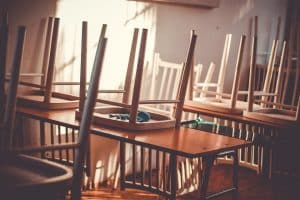Learner-Centered Tip of the Week: Planning to Hold onto the Learning
CompetencyWorks Blog
 This post originally appeared at the Learner Centered Practices Blog on June 5, 2018. Belolan is the instructional coach for RSU2 in Maine.
This post originally appeared at the Learner Centered Practices Blog on June 5, 2018. Belolan is the instructional coach for RSU2 in Maine.
It is easy, almost natural, to see these last few weeks of the year as an end, something that needs to be tied up neatly. In some ways it is. But what would happen if we stopped thinking of the last weeks as the end, and started thinking of it as something else? Instead of closing the books and cleaning out the lockers, what if we found a way to keep the books open, so to speak? I’m not talking about summer work, I’m thinking a little differently here.
In many schools or districts, information gets passed on to the next year’s teacher. This sharing tends to happen more formally in the lower grades. The thing is, it is the teachers who are in control of the information that is shared. The teachers compile it, the teachers pass it along, and the teachers keep it. Where are the learners in this sharing? Throughout the year we have had them self assessing and reflecting on learning, why then are they not a major part of this passing along of information? Some learners even put together portfolios to share with parents. What happens to those portfolios afterwards? How much of what the learners did and accomplished is actually carried through to the next year? Why do we leave it up to the teachers to be the holders of that information?
I think we can do better. As we grow as practitioners in learner centered proficiency based environments it makes sense that we will begin to see the different places where we can let the learners have more of a voice or an active role. I think this is certainly one of them. So, what are some things we can do to give the learners the responsibility of holding onto their learning and passing it along to the next teacher, or class? Here are some thoughts…
1. Ask the learners! Seriously. This should always be the first thing we think to do whenever we are trying to solve a problem of any kinds that has to do with the classroom, the learning, or the learners themselves. We might have some good ideas, and chances are the learners are going to have even better ones. Call a class meeting, present the problem, and let them go!
2. Pass Along Physical Work. Reading notebooks? Writing notebooks? Science journals? Pass them along. Have learners select representative work samples of their best work, mediocre work, and poor work. Then have them reflect on their learning and habits of mind around the work. Give the learners Likert scales for different statements. The key here is that these artifacts are not for the teachers (sure, teachers, go ahead and look at it), they are for the learners. During the first few days of school, have the learners look over their work and use it to reset goals and find their grounding in their learning again.
3. Learner Summary Pages. If the idea of passing along any amount of physical artifacts feels to big, or too complicated, then put together some learner summary sheets. Highlight habits of mind, guiding principles, successes and struggles from the year. Also include spots for learners to include any other information they want to make sure they remember.
See also:
- Learner-Centered Tip of the Week: Yes They Can
- Learner-Centered Tip of the Week: Three Ways to Bring More Learner Voice into Learning Opportunities
- Learner-Centered Tip of the Week: Four Tips for Crafting Driving Questions
Courtney Belolan works at RSU 2 in Maine where she supports K-12 teachers with performance-based, individualized learning. Courtney works closely with teams and teachers as a coach, and with the school and district leadership teams as an instructional strategist. Courtney has worked as a 6-12 literacy and instructional coach, a middle level ELA teacher, an environmental educator, and a digital literacy coach. Her core beliefs include the idea that the best education is one centered on student passions and rooted in interdisciplinary applications, and that enjoying learning is just as important as the learning itself.